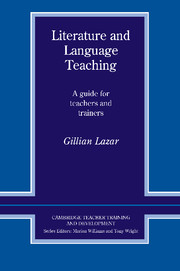Book contents
- Frontmatter
- Contents
- Thanks
- Acknowledgements
- Introduction
- 1 Using literature in the language classroom: The issues
- 2 Approaches to using literature with the language learner
- 3 Selecting and evaluating materials
- 4 Reading literature cross-culturally
- 5 Materials design and lesson planning: Novels and short stories
- 6 Materials design and lesson planning: Poetry
- 7 Materials design and lesson planning: Plays
- 8 Reflecting on the literature lesson
- 9 Literature and self-access
- Answer key
- Trainer's notes
- Bibliography
- Appendix: Eveline by James Joyce
- Index
4 - Reading literature cross-culturally
Published online by Cambridge University Press: 04 May 2010
- Frontmatter
- Contents
- Thanks
- Acknowledgements
- Introduction
- 1 Using literature in the language classroom: The issues
- 2 Approaches to using literature with the language learner
- 3 Selecting and evaluating materials
- 4 Reading literature cross-culturally
- 5 Materials design and lesson planning: Novels and short stories
- 6 Materials design and lesson planning: Poetry
- 7 Materials design and lesson planning: Plays
- 8 Reflecting on the literature lesson
- 9 Literature and self-access
- Answer key
- Trainer's notes
- Bibliography
- Appendix: Eveline by James Joyce
- Index
Summary
In Chapter 1 we touched very briefly on the problems of teaching literature across cultures. It was pointed out that readers invariably interpret texts in the light of their own world-view and cultural experience (Section 1.3). It was also mentioned that the relationship between a literary text and the culture in which it is produced is highly complex, since few texts are mere factual representations of their culture (Section 1.5).
In any teaching situation, there are obviously some literary texts which are likely to present fewer cultural problems for students than others. For example, a text in English by a writer of a similar cultural background to the group of students studying the text may be more culturally accessible than a text written by an author from a culture far removed from the students' own. On the other hand, a text from another culture which deals with themes relevant to the students' own society may prove to be both accessible and absorbing. In other words, the selection of suitable texts (as discussed in Chapter 3) can be quite complicated. And as there are many countries in the world where teachers have little say in the choice of texts, we may sometimes find ourselves using texts which are remote from our students’ own experience. In addition, although students may find it easier to respond personally to a text from within their own culture, there is a strong argument for saying that exposing students to literature from other cultures is an enriching and exciting way of increasing their awareness of different values, beliefs, social structures and so on.
- Type
- Chapter
- Information
- Literature and Language TeachingA Guide for Teachers and Trainers, pp. 62 - 70Publisher: Cambridge University PressPrint publication year: 1993



